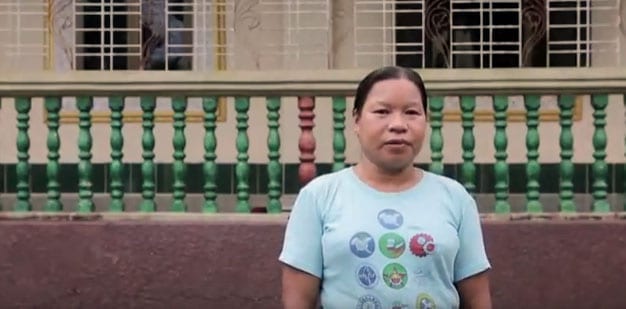
Mar 1, 2018
Hello. I am Daw Tin Tin Thein. I am 43 years old. I have worked in this factory for nine years. I am responsible for sanitation and garbage collection in this factory. It means I am responsible for keeping this factory clean and tidy.
I have been a member of the trade union for four years. During these four years, I found that the negotiations and coordination between the factory owner and the CBA [collective bargaining agreement] have resulted in many successful resolutions.
Workers receive salaries and minimum wages. Workers also enjoy transportation services and social security benefits. We conduct educational activities under the leadership of CTUM [Confederation of Trade Unions-Myanmar].
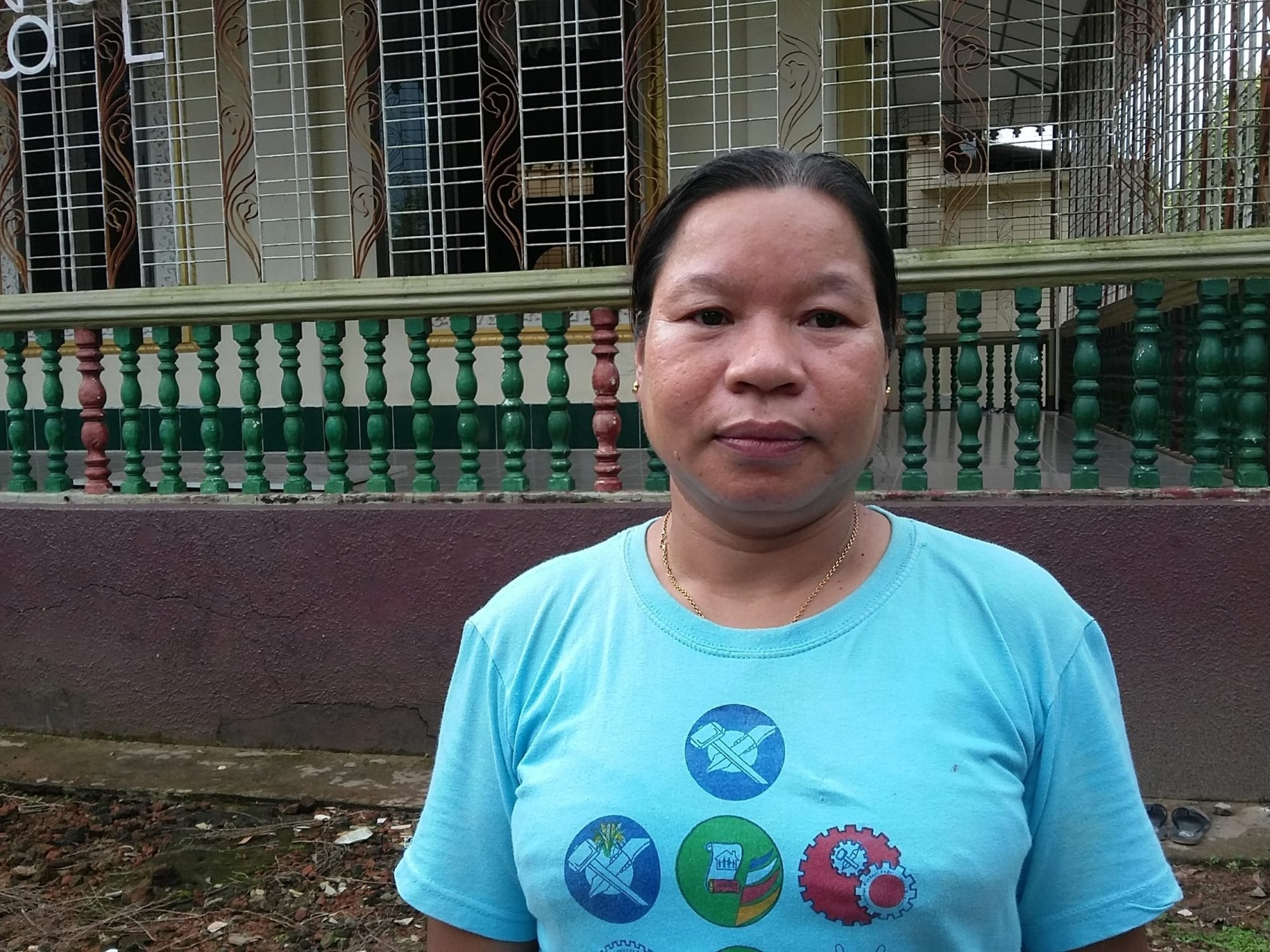
Mar 1, 2018
Daw Tin Tin Thein, 43, works in a factory just outside Yangon, Myanmar’s capital, where workers ground and mold clay for building materials like floor and roof tiles. Thien, a janitor, beams with pride when she describe how she is responsible for “keeping the factory clean and tidy.”
As a member of the Confederation of Trade Unions-Myanmar (CTUM), she says workers receive social security benefits and have access to educational opportunities.
Thein is among workers whose unions and associations the Solidarity Center works with around the world—and she tells her story at the Solidarity Center Workers Equality Forum.
At the Workers Equality Forum, domestic workers from Kenya, garment workers from Cambodia, factory workers in Honduras and many others share their struggles on the job and often, how they are winning rights on the job through their unions.
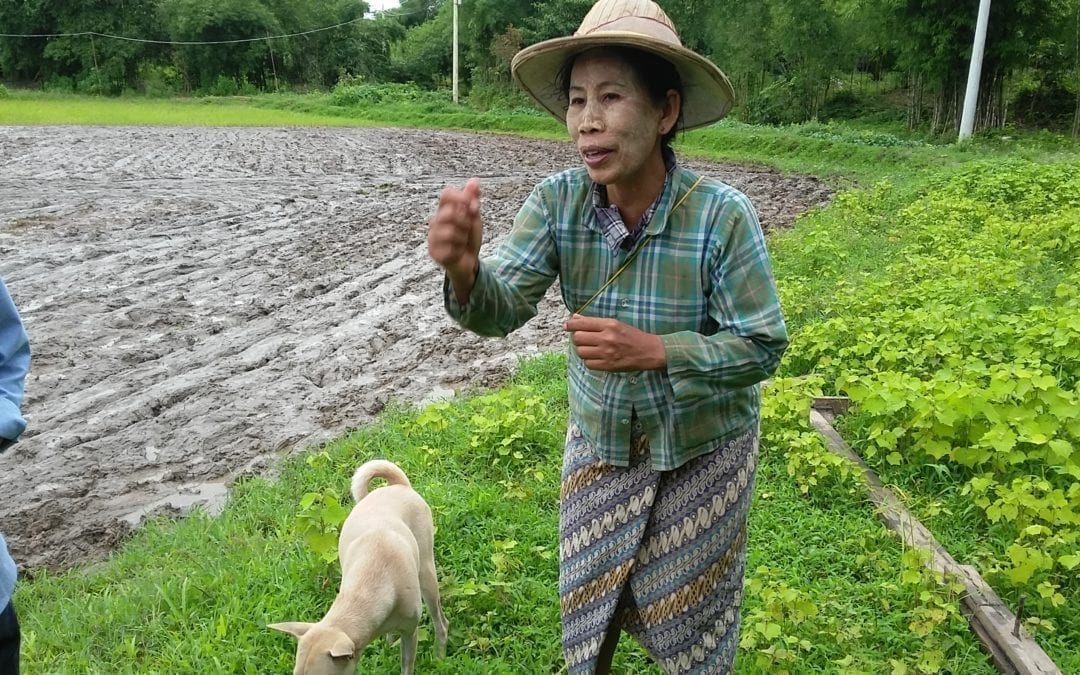
Aug 28, 2017
For years, Kyin San, like many rice farmers in Myanmar, worried that her land would be confiscated for large-scale development, as had so many other farms over the years.
But now, Kyin Sun says, farmers are no longer hesitant to negotiate with the government to settle disputes. Along with 10,000 other farmers in the Hlae Ku Township, Kyin Sun has joined the Agriculture and Farmer Federation of Myanmar (AFFM), part of the Confederation of Trade Unions–Myanmar (CTUM).
“Through CTUM, we have made much progress,” she says.
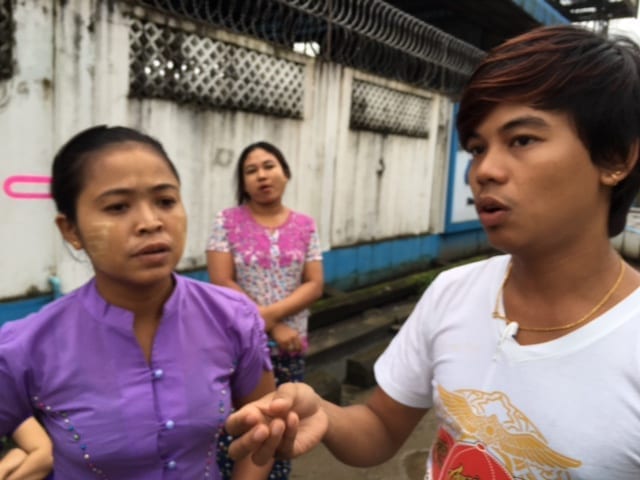
Aug 26, 2016
Fifteen minutes before the gray, 12-foot gate of the garment factory compound in Myanmar’s Hlaing Thar Yar industrial zone opens to release workers, vendors selling fried chicken on sticks and bags of nuts gather in anticipation. At a designated time, the guards roll back the gate and the vendors push their heavy carts up a steep hill and into the compound. If they hesitate, they are locked out as guards quickly close the gate behind them.
Minutes later, the gate is opened again, and workers rush down the hill to the dirt road, jostling for a place on the open transport trucks that will take them over rutted roads to packed apartments where they pay nearly a quarter of their wages to live. There, they can again access their mobile phones, which are prohibited from factory premises, where the heavy gate locks them behind steep walls from the start to the end of their daily shifts, six days a week.

Lwin Lwin Mar migrated from Myanmar’s Irrawaddy Delta in search of a job, and now is among 300,000 garment workers in Hlaing Thar Yar industrial zone. Credit: Solidarity Center/Tula Connell
The scene is repeated countless times across the vast industrial zone, where more than 700,000 workers toil, including 300,000 garment workers. Corporate brands from around the world source their clothes, shoes and other apparel to factories in Hlaing Thar Yar.
Most of the workers, like Lwin Lwin Mar, 34, migrated to Hlaing Thar Yar, 12 miles northwest of Yangon, from other areas in Myanmar. Lwin Lwin Mar came from Irrawaddy Delta in search of a job after the 2008 cyclone devastated the region. Aung Myint Myat, a co-worker of Lwin Lwin Mar from the Bago region, sends money back home to his relatives, as do many factory workers.
Both garment workers helped form a union at a 200-worker factory, standing up to massive employer resistance. Many workers were fired in 2015 for forming the union, but with the assistance of the Confederation of Trade Unions–Myanmar (CTUM), some workers returned to the job.
“The life of workers is very poor,” says Myo Zaw Oo, a CTUM organizer who helps garment workers form unions and helps solve their problems at the workplace. “Workers don’t know about their rights. They are very vulnerable,” he says, speaking through a translator.
Unions Seek to Ensure Labor Helps Shape the New Economy
Last year, Myanmar passed its first-ever law setting a minimum wage—$83 per month—yet employers do not always pay it. Nor do they follow the country’s minimal safety and health regulations or overtime laws, union activists say, making worker education a top priority for CTUM. Even the full minimum wage is not sufficient for workers to support themselves and their families, union leaders say.
After five decades of military dictatorship, political transformation has opened the country in the past few years, and union leaders have sought to ensure that workers are part of the process structuring the ensuing economic and cultural change.
Shortly after he returned to Myanmar in 2012 after nearly 30 years in exile, CTUM President U Maung Maung met with corporate leaders of international brands at a Washington, D.C., conference sponsored by the Solidarity Center and AFL-CIO. The meeting was part of a labor-backed process to ensure corporate accountability and respect for worker rights are embedded at the start of the foreign investment process in Myanmar.
“Labor needs to be involved from the start,” Maung Maung said at the conference. “I would rather have workers’ rights built in from the beginning rather than added on later.”
Helping Workers Form Unions Across Myanmar
Today, CTUM is spearheading union building at a rapid pace, with more than 60,000 workers forming unions since 2012, when Myanmar passed laws allowing the creation of unions. Factory-level union activists like Two Ko Ko, 32, are identified for leadership potential in CTUM, and invited to take part in training to build their skills.
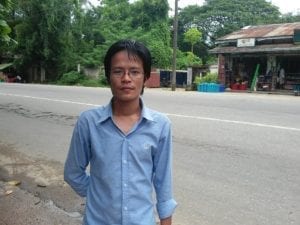
Two Ko Ko, an organizer with the Building, Woodworkers Federation–Myanmar, a CTUM affiliate, helps workers form unions at cement and plywood factories in Hmawbi, an hour north of Yangon. Credit: Solidarity Center/Tula Connell
Now an organizer with the Building, Woodworkers Federation–Myanmar, a CTUM affiliate, Two Ko Ko helps workers form unions at cement and plywood factories in Hmawbi, an hour north of Yangon, as well as at construction sites.
“Workers don’t understand that they have rights that are on the books,” he says. “Law enforcement is weak. Unions help make employers follow the laws.”
For instance, says U Lim Mg, union president of a 170-worker clay factory where workers formed a union in 2012, “the union is enforcing the 1951 Factory Act that governs hours and safety.”
The workers ground and mold clay to make floor and roof tiles and are exposed to heavy dust. But until they formed a union, the employer provided only flimsy paper masks. Now, they have proper protective equipment, says Two Ko Ko.
“I have seen much progress since the union has been at the workplace,” says Tin Tin Than, 43, who has worked as cleaner for 10 years at the clay factory. She says their collective bargaining agreement ensures the employer pays the minimum wage and provides transport to and from the factory.
Despite the many challenges, including strong employer resistance to unions and a broad lack of familiarity with fundamental worker rights, Myanmar union activists like Two Ko Ko are determined to help workers achieve decent wages, safe and healthy workplaces and respect at work.
“The best part of my job,” he says, “is when people recognize their rights and decide to form unions.”
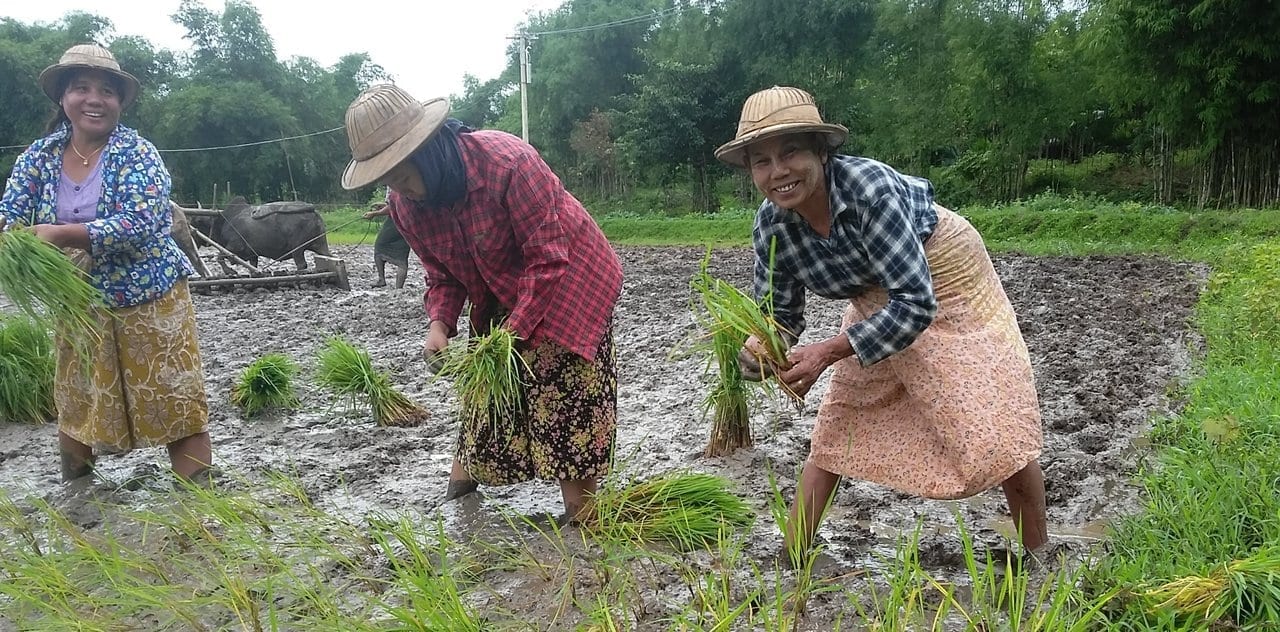
Aug 17, 2016
On a hot, damp morning in Hlae Ku Township, Myanmar, Kyin San surveys the rice fields spread below her, as Mg Zaw, knee deep in mud, drives two oxen to plow the remaining plot. For many years, Kyin San, like most of the farmers in the area, worried that her land would be confiscated for large-scale development, as had so many other farms over the years.
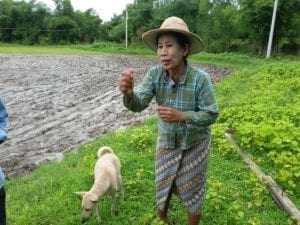
Burmese rice farmer Kyin San says by joining a union, farmers can share strategies and techniques to improve their craft. Credit: Solidarity Center/Tula Connell
But now, Kyin Sun says, farmers are no longer hesitant to negotiate with the government to settle disputes. Along with 10,000 other farmers in the township, Kyin Sun has joined the Agriculture and Farmer Federation of Myanmar (AFFM), part of the Confederation of Trade Unions–Myanmar (CTUM).
“Through CTUM, we have made much progress,” she says, speaking through a translator.
Farmers across Myanmar are the fastest growing group of workers forming unions since 2011, when a new law allowed creation of unions. Within weeks of the law’s passage, farmers, woodworkers, garment workers, hatters, shoemakers and seafarers quickly registered their unions.
Connecting Farmers
Htay Lwin, president of the Hlae Ku Township agricultural union, says farmers also have sought to join unions to learn new technical skills to improve their farming techniques, a goal Kyin San says has been advanced by union membership.
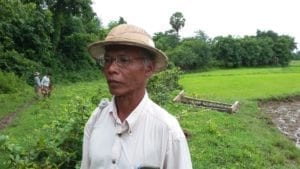
Union President Htay Lwin says many farmers are joining unions to protect their land from being confiscated for large-scale development. Credit: Solidarity Center/Tula Connell
“Now we can communicate with farmers across the country and share our experience with others,” she says.
AFFM members are connected with the Asian Farmers Association for Rural Development, a regionwide organization based in the Philippines that provides training on seed production, food safety and other issues, says CTUM President U Maung Maung.
Speaking from CTUM offices in downtown Yangon, Maung Maung discussed how the federation is moving forward with the plan he nurtured for decades during his political exile in Thailand.
“We are doing what we wanted to do for the past 30 years—building unions, getting into negotiations with employers, trying to develop policies with labor and management,” he says.
Rebuilding Worker Power after Decades of Dictatorship
Maung Maung was forced into exile after a violent military crackdown targeted thousands of pro-democracy demonstrators and labor leaders, many of whom were sent to prison. He returned to Burma in 2012 and since then, CTUM has helped some 60,000 workers organize unions. CTUM received official government registration last year.
Now, CTUM is working with policymakers to enact social welfare reforms and drafting recommendations for revising the country’s labor laws, many of which were enacted when the country achieved independence from Britain in 1948. After decades of military rule, Myanmar trails many Asian nations economically, and Maung Maung sees much work ahead in modernizing the workforce and developing a culture of social dialogue among workers, business and government common in other countries.
Fundamental to effecting the change CTUM envisions is educating workers about their rights. Workers for many years had no freedom to improve their working conditions, and unions now are helping them understand that they can stand up for their rights—and how to do so.
Because, as Maung Maung says, it all comes down to the workers.
“The workers have to know what they want—and they have to push for it.”









